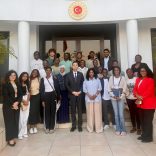Official numbers on medical treatment for substance abuse rise in 2024, Maputo city leads
Lack of “more ambitious” employment policies increases youth vulnerability

Analysts told Lusa on Friday that the lack of “more ambitious” employment policies to end “youth marginalization” in Mozambique may “broaden the recruitment base” of violent extremism in the country
The Catholic bishops of Mozambique last Tuesday conveyed to Mozambican president Filipe Nyusi their concerns about the vulnerability of young people to recruitment by insurgent groups, notably those carrying out armed attacks in the north of the country, reiterating a position they had already presented at a press conference on the 16th of this month.
Commenting on the bishops’ position, Fernando Lima, journalist and chairman of Mediacoop, the oldest media group in Mozambique, said that the message from Mozambique’s Catholic leaders reflected a “genuine concern for the whole country” and a warning that “more ambitious and aggressive employment policies” for young people must be adopted.
“The government is lagging behind in tackling youth unemployment, especially in the province of Cabo Delgado, where this armed violence broke out,” Fernando Lima said.
The executive, continued Lima, must adopt employment strategies that are more pragmatic and in line with the reality of poor areas which have natural resources.
“The argument of the lack of qualifications to employ young people in multinationals that operate with cutting edge technology cannot be valid, and will not stop the violence. It is necessary to invest in the accelerated training of workers with fewer skills who are necessary in megaprojects,” Lima advanced.
The journalist indicated that “unemployment and a lack of vision are also causes of delinquency in the urban centres”.
Adriano Nuvunga, a political analyst and director of the Centre for Democracy and Development (CDD), a Mozambican civil society organisation, says that the despair caused by unemployment could “increase vulnerability and widen the recruitment base for violent extremism”.
“Abject poverty is undoubtedly one of the roots of violent extremism. It is necessary to create hope for young people, if they are not to be enticed by terrorist groups,” he declared.
The marginalisation of young people is a “chronic scourge” across the country, but the issue has become “more explosive in Cabo Delgado” because “they started to see demonstrations of great wealth, with the presence of multinationals, foreigners and members of the Mozambican elite”, Nuvunga said.
“With the natural gas projects in progress, the differences and social injustices were more exposed and were taken advantage of by extremists to mount the violent reactions that we are seeing,” Nuvunga emphasised.
Dércio Alfazema, an analyst and project director at the Institute for Multiparty Democracy (IMD), a non-governmental organisation, also pointed to high unemployment as a cause of violence and insecurity in Cabo Delgado, as well as in the rest of the country, warning of the danger of over-simplifying the causes of social conflict.
“Any type of violence merits a deeper study and analysis, because the causes are always several,” he advocated.
Elaborating his thesis, Alfazema said that all provinces in the country had “stark pockets of poverty and unemployment”, but only Cabo Delgado had seen a wave of violence associated with extremism.
“Desperation and lack of perspectives among young people is common across the country, so it is necessary to investigate the causes of violence in Cabo Delgado further, so that we do not fall into oversimplification,” he said.
In a message released last week, the Episcopal Conference of Mozambique (CEM) argued that the marginalisation of youth could spread the armed insurgency in the country, blaming the “lack of hope for the future” among young people as one of the causes of violence in Cabo Delgado.
“We recognise that one of the reasons that motivates our young people to allow themselves to be enticed and join the various forms of insurgency, from crime to terrorism, is based on the lack of hope in a favourable future,” CEM spokesman João Carlos said.
For the CEM, the majority of youth, especially in rural areas, feel marginalised by political power, which results from the absence of a “common project” for the country’s development.
“It is easy to entice people full of life and dreams but without perspective, who feel wronged, and victims of a culture of corruption, with the proposal for a new social order imposed through violence,” Bishop of Chimoio João Carlos said.













Leave a Reply
Be the First to Comment!
You must be logged in to post a comment.
You must be logged in to post a comment.